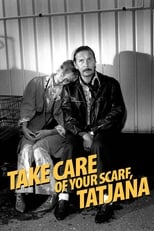CRCulver
Jun 5, 2018
5/10
Shot in 1993, TAKE CARE OF YOUR SCARF, TATJANA! is one of Aki Kaurismäki's lesser-known films from this highly productive period in the Finnish auteur's career. Coffee addict Valto (Mato Valtonen) and vodka-guzzler Reino (Matti Pellonpää) go for a test drive through the Finnish countryside in Valto's newly-repaired sedan. They meet two tourists from the former USSR, Tatjana (Kati Outinen) and Klavdia (Kirsi Tykkyläinen) who are stranded along a rural road after their tour bus has broken down. The women convince Valto and Reino to drive them to the port in Helsinki so they can get the ferry home, and the film tracks their adventures together – or rather the lack thereof: even as Tatjana and Klavdia try to chat and even flirt, the taciturn Finns just swill their coffee or vodka and ignore them. The film features well-known themes in Kaurismäki's work: shy people unable to express emotion, a love for early rock 'n' roll with a period band performing on a stage at some point, and a minimum of dialogue.
With its running time of less than an hour, its black-and-white photography and its spare, sketch-like plot, this even feels like the quintessential minor effort or short in an arthouse director's filmography. (Kind of like some of the "Coffee and Cigarettes" shorts in Jim Jarmusch's output.) It also feels unsatisfying. There's some enjoyable comedy here, but to get the jokes TAKE CARE OF YOUR SCARF, TATJANA assumes a knowledge of Finnish culture even more than Kaurismäki's other work. Some of the tension between the men and the people they encounter is based on the subtle divide between Helsinki and rural Finland -- this is an unusual film for Kaurismäki in eschewing a Helsinki setting for the backwoods. Valto and Reino's respective beverage addictions are the usual ones of this Nordic country, just exaggerated to a risible degree. The way that the Estonian and Russian women fall for these boring losers, mocks the early 1990s phenomenon of even an ugly country bumpkin being able to get himself a glamorous wife from the former USSR just because Finland was seen as comparatively rich.
Now, I've lived in Finland and could pick up all the jokes, and I laughed out loud at a couple of points, but I found this a middling effort, and because most readers of this review probably won't have the necessary background, I've rated it even lower than average.
